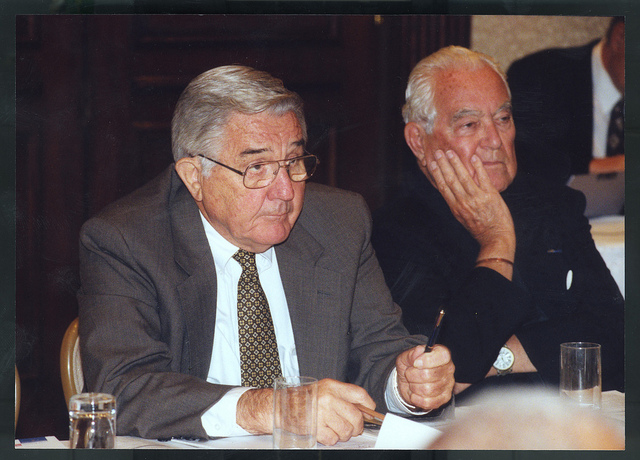The Rev. Theodore Hesburgh, founding co-chairman of the Knight Commission on Intercollegiate Athletics and president emeritus of the University of Notre Dame, died February 26, 2015. He was 97.
Father Hesburgh was co-chairman with William C. Friday, president emeritus at the University of North Carolina, Chapel Hill, when the Knight Commission was formed in 1989 and issued its landmark report two years later calling for a reform agenda that emphasized presidential leadership and academic and financial integrity in college sports.
Hesburgh again teamed with Friday to lead the Commission when it issued a second report in 2001, the last year of Hesburgh’s service on the Commission. A central recommendation in the 2001 report called for an academic threshold for teams to be eligible for postseason competition. This concept led to the NCAA adopting the academic performance system that created greater accountability and now requires teams to be on track to graduate 50 percent of their players to be eligible for postseason championships.
Knight Commission co-chairman William E. (Brit) Kirwan, chancellor of the University of Maryland System, said: “His willingness to step forward to act and speak on the major social and economic issues confronting higher education, ranging from social equity to intercollegiate athletics, has left an indelible mark on our nation. While it is doubtful we will ever see his like again, we secure his legacy by striving to meet the brave and ethical standards he set.”
Knight Commission co-chairman R. Gerald Turner, president of Southern Methodist University, said: “In addition to shaping the University of Notre Dame into the prominent institution it is today, Father Hesburgh influenced higher education nationally through extraordinary leadership that transcended one institution or one denomination. He was a tenacious advocate on global humanitarian issues and an outspoken defender of academic freedom. In co-founding the Knight Commission, he provided a platform for presidents to address issues in intercollegiate athletics, especially the role of athletics in the overall educational mission. He reshaped the profile of a university president, setting an example from which all of us can learn. His presence will be missed but will live on.”
Hesburgh’s contributions to intercollegiate athletics were recognized by the NCAA in 2004 when it named him the inaugural recipient of the association’s prestigious Gerald R. Ford Award, which honors an individual who has provided significant leadership in the role of advocate for intercollegiate athletics and has done so on a continuous basis over the course of his or her career.
Hesburgh was named president of Notre Dame in 1952, at the age of 35, and served until 1987. During his tenure, he became one of the pivotal figures in higher education of the 20th century. He advised presidents, popes, and politicians on issues far beyond academe. In 2000, President Clinton bestowed on him the Congressional Gold Medal, 26 years after President Johnson gave him the Medal of Freedom, the highest civilian honor awarded by the United States government.
He held 16 presidential appointments during his tenure, including terms as charter member and then chairman of the U.S. Civil Rights Commission. His work in civil rights includes membership on the board of the Overseas Development Council, on President Ford’s Presidential Clemency Board, and the Selection Commission on Immigration and Refugee Policy. He also chaired the International Federation of Catholic Universities from 1963 to 1970 and was a member of Harvard University’s Board of Overseers.
Hesburgh studied at Notre Dame and graduated from the Gregorian University in Rome in 1939 with a bachelor’s degree in philosophy. Ordained a priest of the Congregation of the Holy Cross in 1943, he received his doctorate in sacred theology in 1945 from the Catholic University of America and returned to Notre Dame to teach religion and serve as a chaplain to World War II veterans. He was named executive vice president in 1949 and three years later became Notre Dame’s 15th president.
Statement from Knight Commission Co-Chairman William E. (Brit) Kirwan, chancellor, University System of Maryland:
Father Ted Hesburgh’s passing is a cause for both sadness and celebration. For so many in higher education, this iconic leader was our exemplar. Though advancing age muted his voice and prevented his physical presence in our lives of late, the knowledge that he was still there, listening and watching, was a source of comfort and reassurance.
The sadness we feel today, however, must be coupled with celebration…celebration of the life and contributions of a courageous president who set the standard for principled leadership. His willingness to step forward to act and speak on the major social and economic issues confronting higher education, ranging from social equity to intercollegiate athletics, has left an indelible mark on our nation. While it is doubtful we will ever see his like again, we secure his legacy by striving to meet the brave and ethical standards he set.
John Quincy Adams once said, “If your actions inspire others to dream more, learn more, do more and become more, you are a leader.” By this measure, Father Hesburgh was the quintessential leader.
Below: Friday and Rev. Theodore Hesburgh co-chair the 2000 Knight Commission meeting in Washington, D.C. Photo by Harvey Bilt.

